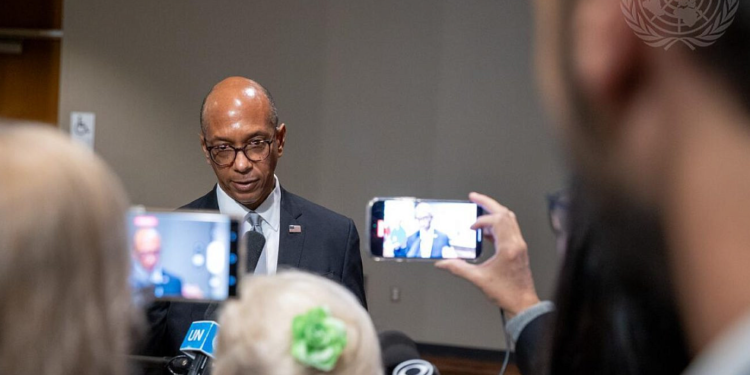Nov 27, 2024 Story by: Editor
The United States on Wednesday, November 20, vetoed a United Nations Security Council resolution calling for a ceasefire in Gaza, prompting criticism of the Biden administration for once again blocking international efforts to halt the bloodshed in Gaza.
The resolution, proposed by 10 non-permanent members of the 15-member council, sought an “immediate, unconditional, and permanent ceasefire” in the ongoing 13-month conflict, while also demanding the release of hostages. Despite the majority’s support, the U.S., as a permanent member, exercised its veto to block the resolution.
Deputy U.S. Ambassador to the U.N. Robert Wood explained that the U.S. could not support a resolution that did not explicitly demand the release of a few left hostages as part of a ceasefire. While millions of people in Gaza are suffering beyond anyone’s imagination. They are left to die of hungry and uncountable air strikes. “A durable end to the war must come with the release of the hostages. These two urgent goals are inextricably linked. This resolution abandoned that necessity, and for that reason, the United States could not support it,” Wood stated. He further argued that the resolution’s wording could send a “dangerous message” to Hamas, suggesting there was no need for negotiation.
The conflict in Gaza has led to the deaths of nearly 45,000 people, with nearly the entire population of the enclave displaced at least once. Moreover, 70% of these martyrs were women and children. Members of the Security Council criticized the U.S. decision, including the council’s 10 elected members—Algeria, Ecuador, Guyana, Japan, Malta, Mozambique, South Korea, Sierra Leone, Slovenia, and Switzerland. Vanessa Frazier, Malta’s U.N. Ambassador, expressed regret, stating, “It is deeply regretted that due to the use of the veto, this council has once again failed to uphold its responsibility to maintain international peace and security.” She emphasized that the resolution represented “the bare minimum of what is needed to begin to address the desperate situation on the ground.”
Food security experts have warned of an impending famine among Gaza’s 2.3 million residents. Despite this, U.S. President Joe Biden has continued to support Israel diplomatically and militarily, while attempting unsuccessfully to mediate a ceasefire that would stop this genocide and release Palestinians detained by Israel.
While the U.S. vetoed the current resolution, reports indicate that Washington had considered supporting alternative language proposed by Britain, which was ultimately rejected by the elected members. A senior U.S. official, speaking anonymously, suggested that some council members prioritized prompting a U.S. veto over compromise, with Russia and China allegedly encouraging this stance.
France’s ambassador, Nicolas de Riviere, highlighted that the resolution included a firm demand for the release of hostages. “France still has two hostages in Gaza, and we deeply regret that the Security Council was not able to formulate this demand,” he said. Meanwhile, China’s U.N. Ambassador Fu Cong accused the U.S. of enabling ongoing violence by attaching conditions to a ceasefire. “Insistence on setting a precondition for a ceasefire is tantamount to giving the green light to continue the war and condoning the continued killing,” Fu remarked. Source: Reuters












![U.S. Attorney General Merrick Garland has announced that the Justice Department will be filing a lawsuit against Georgia’s election law, which introduces new restrictions on voting. [Ken Cedeno/Reuters]](https://blkpoliticsnow.com/wp-content/uploads/2024/10/ewterg-120x86.png)




